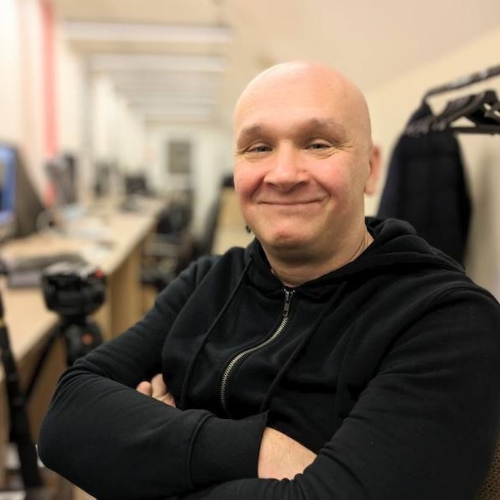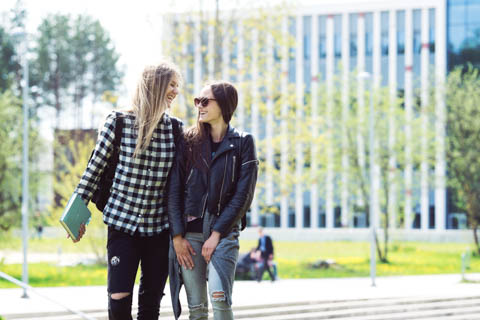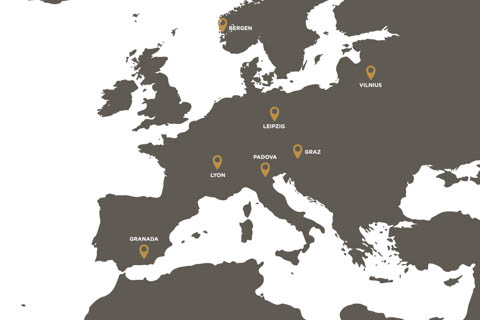Russian Studies (Media Linguistics)
| Faculty Faculty of Philology |
|
|
|
Scope of studies and length 120 ECTS credits, 2 years |
|
|
Qualification awarded Master of Humanities |
|
|
Application deadline* 1 May / 1 July |
|
|
Language Russian |
|
|
Tuition fee per year* EU/EFTA students can apply for a state-funded places |
|
|
Start of studies
1 September
|
| City Vilnius |
The “Russian Studies (Media Linguistics)“ programme aims to train specialists with a strong command of media language and solid expertise in the ever-evolving digital media landscape. This program is designed for those looking to deeply engage in analysing and interpreting media texts across various platforms, utilising cutting-edge media linguistic methodologies. At the same time, awareness of Russia's cultural nuances and historical contexts enhances one’s ability to decode hidden meanings and intentions embedded in media content, making this program vital today.
The programme is open to graduates from all disciplines with proficiency in Russian at the B2+ level according to the Common European Framework of Reference for Languages. All courses in the programme are taught in Russian.
Why choose this programme?
|
What's after?
|
 "Vilnius has historically been a center of intersection for languages and cultures, and studying within the walls of Vilnius University is a true happiness and a great honor. I enrolled in the Faculty of Philology intending to obtain a systematic humanities education, touching the tradition, and getting acquainted with innovative research in the field closest to me: Media Linguistics. The Russian Studies MA programme may seem an unexpected choice in our challenging times. Still, it led me to immerse myself in a unique – some might say nourishing – environment, which fully met my expectations. The Russian language still serves as the lingua franca for a huge number of people, and the Russian Studies MA program covers the widest range of disciplines: from the Methodology of Literary Studies to Typological Linguistics, from the History of the Grand Duchy of Lithuania, to such an exclusive and topical course as East-West in Russian Culture, from Semantics and Pragmatics to Cognitive and Media Linguistics, and much more. The program is very intensive, and the two years of study were challenging. However, the ongoing support of the professors, the true spirit of academic freedom, and the amazing atmosphere of the ancient corridors of Vilnius University – combined with progressive educational technologies – it all facilitated my studies and inspired me to overcome difficulties. But the most important thing you get after graduating from the Program, in addition to new knowledge, research skills, experience of communication with endlessly dedicated professors and lots of student emotions, is motivation. Motivation to move forward, to learn more, and to try to explore our complicated world in our challenging times."
"Vilnius has historically been a center of intersection for languages and cultures, and studying within the walls of Vilnius University is a true happiness and a great honor. I enrolled in the Faculty of Philology intending to obtain a systematic humanities education, touching the tradition, and getting acquainted with innovative research in the field closest to me: Media Linguistics. The Russian Studies MA programme may seem an unexpected choice in our challenging times. Still, it led me to immerse myself in a unique – some might say nourishing – environment, which fully met my expectations. The Russian language still serves as the lingua franca for a huge number of people, and the Russian Studies MA program covers the widest range of disciplines: from the Methodology of Literary Studies to Typological Linguistics, from the History of the Grand Duchy of Lithuania, to such an exclusive and topical course as East-West in Russian Culture, from Semantics and Pragmatics to Cognitive and Media Linguistics, and much more. The program is very intensive, and the two years of study were challenging. However, the ongoing support of the professors, the true spirit of academic freedom, and the amazing atmosphere of the ancient corridors of Vilnius University – combined with progressive educational technologies – it all facilitated my studies and inspired me to overcome difficulties. But the most important thing you get after graduating from the Program, in addition to new knowledge, research skills, experience of communication with endlessly dedicated professors and lots of student emotions, is motivation. Motivation to move forward, to learn more, and to try to explore our complicated world in our challenging times."
Grigory Skomorovskiy (Producer, Lecturer in Media production)


